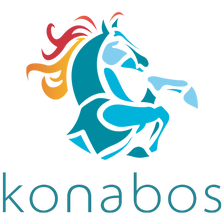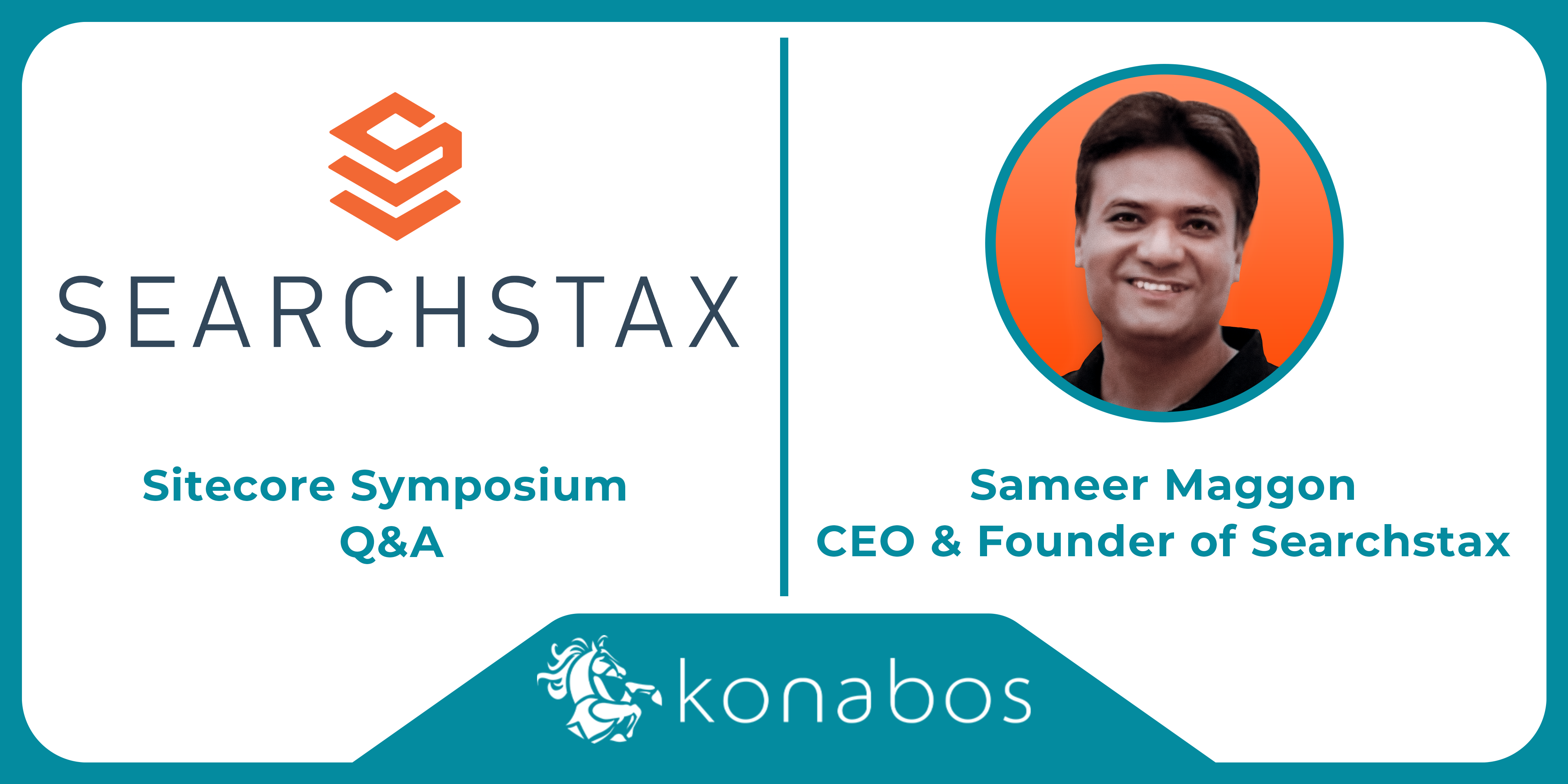Sitecore Symposium Q&A With Sameer Maggon, CEO & Founder of SearchStax
Matthew McQueeny - Relationships & Community Lead
1 Nov 2022
SearchStax CEO Sameer Maggon answered questions for us surrounding Sitecore Symposium 2022. SearchStax, which offers end-to-end search solutions for better search, was an event sponsor at Sitecore Symposium and is a valued partner of Konabos.
Question: Why is search so important in the modern tech landscape?
Sameer Maggon: Lack of findability creates frustration for users, erodes trust and increases missed opportunities. Search has always been important for websites and content heavy applications where users are looking for information quickly. The problem is compounded as the rate of digital transformation, and therefore the amount and types of data we need to search across, increases.
Solutions typically required high investment by organizations in specific industries who could afford high investment and prolonged return. The current technology landscape and companies like SearchStax are making it accessible to all organizations, which is groundbreaking.
Q: Was it a further affirmation to you and your product (from industry and positioning point of view) that "Sitecore Search” was one of the major (4) announcements at Symposium? (It was also the first announced product in the press release)
SM: In general, the short answer is that yes, as a technology category, search is undergoing a resurgence as modernization needs push organizations to get better at search -- SearchStax is already extremely well positioned in that regard.
Sitecore always recognized the need for better Search, which is why they had partners like Coveo and SearchStax. My opinion is that the new product announcement by Sitecore appears to be in response to a particular segment or some use cases of their customer base. It’s not clear yet, because they’ve not revealed the price points or specific use cases where Sitecore Search will shine. We will perhaps know more as Sitecore shares that information.
Q: How does SearchStax fit into the Sitecore ecosystem? Is it similar to the way SearchStax plugs-and-plays with other platforms?
SM: SearchStax provides two product offerings
- SearchStax Cloud - Solr-as-a-Service on AWS, Azure and GCP
- SearchStax Studio - Powerful Site Search Solution
Sitecore is utilized by enterprises to build websites and content driven applications. Most companies using any of their product lines (on-prem, paas and SaaS) that deliver websites have a need for better findability for content, thus site search – which is, as I mentioned before, why Sitecore has relied on partners such as SearchStax for critical search capabilities
Sitecore’s XP line of products require Solr as a component to operate. Additionally, more of those customers want a site search solution that can be quickly operationalized and enable marketers to do their jobs more easily. Therefore, both of SearchStax products are very relevant to majority of their customer base.
Any consumer facing application that has decent content and has a need for their users to be able to find content, SearchStax has applicability. SearchStax is also utilized by companies running Adobe Experience Manager, Acquia, Drupal, Moodle and custom built websites and applications.
Q: What does Sitecore’s announced composable pivot mean for the SearchStax integration?
SM: SearchStax has always been an API-first company. It’s great to see Sitecore moving towards a model where it allows customers to provide optionality of software that is best suitable for their needs. It provides customers with the ability to bring the right product in for their use case without limiting their options.
SearchStax has headless front end search experience components and APIs at the backend - not much has changed for us. We even demoed SearchStax on XMCloud at Symposium!
Q: Why is Sitecore still such an important platform?
SM: I’ll let you ask Sitecore that question directly – from the SearchStax perspective, they are a key partner and will continue to be for the foreseeable future. We have many joint customers who are doing innovative things and taking advantage of the partnership – including fast implementation using our plugin; leveraging Sitecore’s rich CMS features; and the advantages of SearchStax, including compliance to data privacy requirements and all the typical benefits of a SaaS offering, to deliver better experiences.
Q: How were your demos at Symposium received? Are there common themes (pain points, epiphanies) you are hearing?
SM: We had great interest at our booth during the Symposium! We had live demos multiple times during the three days and had an overwhelming response during that time. We continue to hear the same themes that have been the foundation of our products:
- Best-in-class end user experience
- Actionable insights
- Enable marketers to respond rapidly to change
- Ease of use for Marketers and Developers
- Affordability
Q: Are there initiatives – that you can talk about – that particularly excite you on your SearchStax roadmap?
SM: The most interesting recent product we introduced was our SearchStax Studio offering, which enables us to deliver value directly to the marketing team, and addresses a pressing issue in any organization trying to deliver a quality user experience. The reason it’s so interesting is because SearchStax is uniquely solving the problem in a way that “moves up the stack” – first, you can solve the core search issues with our Cloud offering, then you can solve the operational issues with our Studio offering, or you can just solve them both at the same time if you are under a pressing transformation directive.
The key is that our approach enables customers to be more in control of their own destiny, but without the prohibitive cost, scaling limits, or rigidity that usually is required to gain that control – and most importantly, to maintain that level of control as they grow and adapt to new requirements.
Our roadmap has many exciting initiatives that will continue to support this vision – putting control back in the hands of the teams that need it.
Earlier this year, we released features that built smarts into our Studio offering with features like Related Searches and Auto-Suggest (aka Predictive Search) that utilizes machine learning techniques. We are continuing to invest there with more ways to provide content recommendations to improve user engagement and experience.
You’ll see more developer tools including sample code, SDKs, client-libraries like React, Angular and NextJS that makes it even more easy for developers to quickly build great search experiences.
We are continuing to build more ways to bring data from different data sources into search that allows our customers to seamlessly provide a unified search experience across disparate content.
Q: Where do you see the search industry moving, as we head into 2023 (and beyond)?
SM: The trend we’re seeing is that “doing search well” is an increasingly integral and critically core component of any platform that requires the delivery of a compelling user experience. Today, the most accelerated development we are seeing is in a few major categories such as DXP, site search, product discovery, and internal operations functions that require searching across massive heterogeneous datasets.
Depending on the vertical industry or application, it can be extremely costly and require multiple standalone solutions with 3rd-party integrations to deliver some subset of capabilities that customers need, which can add barriers to their ability to get a product or service to market and predictably scale its impact. In the midmarket, the challenge can be even greater. That means in order for customers to get the value they need from search, we need to see a similar inflection in search markets as the ones we’ve seen in markets that have resulted in large-scale platforms that deliver value independent of technology stack or segment – e.g., cloud infrastructure is a good example.
Moving forward, I suspect we’ll see more use of analytics, platform interoperability, and more tightly coupled stack-level offerings that deliver end-to-end value for the entire set of personas within an organization who care about any given set of broad use cases that rely on search.

Matthew McQueeny
Matt is a digital marketing professional and web project manager with over 15 years of experience. He has worked with clients ranging from Fortune 500 to startups. Industries of digital project experience include healthcare, publishing, technology, telecommunications, education, retail, entertainment, manufacturing, and transportation. In 2023, Matt was awarded his first Sitecore MVP, in recognition for his work in the Sitecore community.
He loves the intersection of technology, marketing, and communications. Throughout his career, he worked with many licensed and open-source content management systems, in editorial, social media strategy and advertising, search engine marketing, lead generation, analytics, and podcasting.



Share on social media